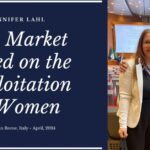The following is an interview I did with a surrogate after she saw our film Breeders: A Subclass of Women?
LAHL: You were a surrogate for your sister and you’ve written a book, Silently I Cried, about your experience (which didn’t go well at all). You’ve watched my new film Breeders. Which surrogate did you resonate with the most and why?
CHARLOTTE : I resonated with each surrogate presenting their story at one point or another.
Tanya’s statement at the end of the film, when she talks about her daughter describing how she looks like her mother, and then her daughter says, “But you gave me away . . .why?” The voice of a child!
Gail’s brother expected her to be a person that fit his lifestyle, his demands. He was insensitive to her as a human and as a mother, and ignored her overall welfare.
Heather’s moral values stood true to her and her belief in God’s plan and God as the giver of life and the taker of life.
Cindy, in her heart she knew something wasn’t right from the start, but like all those willing to give, we overlook the little things until it’s too late. But Cindy’s motherly instinct is to protect her children and she fought for them.
LAHL: When you heard Jessica’s story, about being born via surrogacy, what did this make you think of about your own daughter that you had for your sister?
CHARLOTTE: Jessica’s story reminds me what I’ve stated many times: I never wanted my child to feel lost or unwanted. She’s on her own now though, and she has created a circle of individuals that comfort her as her family — we’re not a part of her life. She has a lot of anger and disbelief. It is sad that I celebrate her life and her birthdays in silence. She celebrates her birthdays now without a mom or dad because they have both died and I’m not a part of her life.
LAHL: How has being a surrogate changed you, your family, your marriage?
CHARLOTTE: Being a surrogate changed me. I don’t always trust people or don’t really care to hear their “cry baby stories” about not being able to have children. My family believes in me though, and they’re stronger due to my actions and my being very opinionated (in truth they’d rather those years be vanished from memory). My marriage is “for better, for worse” and has survived the test of time.
LAHL: What should the laws around surrogacy be in the U.S.?
CHARLOTTE: The laws should not allow for any selling of human life. Our laws must be the voice of the unborn child. Services rendered (surrogacy) should not be considered manufactured goods from the store shelf. Too often individuals feel like I’m ready now, I want it, I deserve it, I will have it no matter the cost. Those individuals should learn to accept the word NO. And our laws should protect the children.
LAHL: What would you tell someone who was thinking about being a surrogate?
CHARLOTTE: If you’re thinking of being a surrogate to supplement an income, find another job. If it’s to help someone, volunteer! There are many agencies looking for volunteers. If you want to feel good about helping others, the emotional ties are far less than they are with surrogacy.
LAHL: What would you tell someone who was thinking of using a surrogate?
CHARLOTTE: Go to an adoption agency. Hear the cry of those children yearning for a loving home. Look to adoption. Just because you think you need, deserve, or want does not make surrogacy the right choice nor fix for your desire to have a child.
LAHL: Why did you write your book?
CHARLOTTE: I wrote Silently I Cried to let my third daughter know she is important and never forgotten. I also wanted to be a voice, to prevent another from the surrogacy experience and to speak out about the lies, disappointments, misbeliefs, hurts, and longings surrogacy brings. But Silently I Cried brings full circle the realization and finally my acceptance of giving away this daughter.
For more information on Breeders: A Subclass of Women? visit Breeders.CBC-Network.org
Author Profile

- Jennifer Lahl, MA, BSN, RN, is founder and president of The Center for Bioethics and Culture Network. Lahl couples her 25 years of experience as a pediatric critical care nurse, a hospital administrator, and a senior-level nursing manager with a deep passion to speak for those who have no voice. Lahl’s writings have appeared in various publications including Cambridge University Press, the San Francisco Chronicle, the Dallas Morning News, and the American Journal of Bioethics. As a field expert, she is routinely interviewed on radio and television including ABC, CBS, PBS, and NPR. She is also called upon to speak alongside lawmakers and members of the scientific community, even being invited to speak to members of the European Parliament in Brussels to address issues of egg trafficking; she has three times addressed the United Nations during the Commission on the Status of Women on egg and womb trafficking.
Latest entries
 infertilityApril 23, 2024The Rise of International Gestational Surrogacy in the U.S.
infertilityApril 23, 2024The Rise of International Gestational Surrogacy in the U.S. Assisted Reproductive TechnologyApril 16, 2024Founder Jennifer Lahl’s Speech on Surrogacy to the Casablanca Declaration
Assisted Reproductive TechnologyApril 16, 2024Founder Jennifer Lahl’s Speech on Surrogacy to the Casablanca Declaration #BigFertilityFebruary 27, 2024No, Alabama Didn’t Ban IVF
#BigFertilityFebruary 27, 2024No, Alabama Didn’t Ban IVF ArticleSeptember 25, 2023The Little Engine That Could
ArticleSeptember 25, 2023The Little Engine That Could

